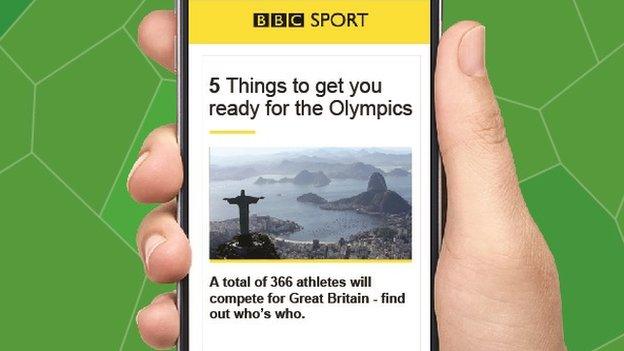Rio Olympics 2016: Did the IOC's gamble pay off or did Brazil fail to deliver?
- Published
- comments
Awarding the Olympic Games to the Brazilian city of Rio in 2009 was viewed as a gamble by some critics.
However, the International Olympic Committee (IOC) saw it as the perfect opportunity to re-emphasise its core message of taking the spirit of sport to as many people as possible.
IOC president Thomas Bach maintains it was a risk worth taking.
"The Brazilians were great hosts and really united behind these Games," he said. "They turned this great competition into a party for everybody.
"The IOC has shown that it is possible to organise the Olympic Games in countries which are not at the top of the GDP ranking."
The problems that played out alongside the sport cannot be ignored, though.
Huge swathes of seats remained empty for key events, blue pools turned green, athletes were mugged, others pretended to be, and a key IOC official - Ireland's Pat Hickey - spent the final days of the Games locked up in a high a security prison accused of trying to pass tickets to touts.
The Olympic movement can tick off another continent but, sporting achievements aside, the feeling is they got away with it - just.
Is the Olympics still a big deal?
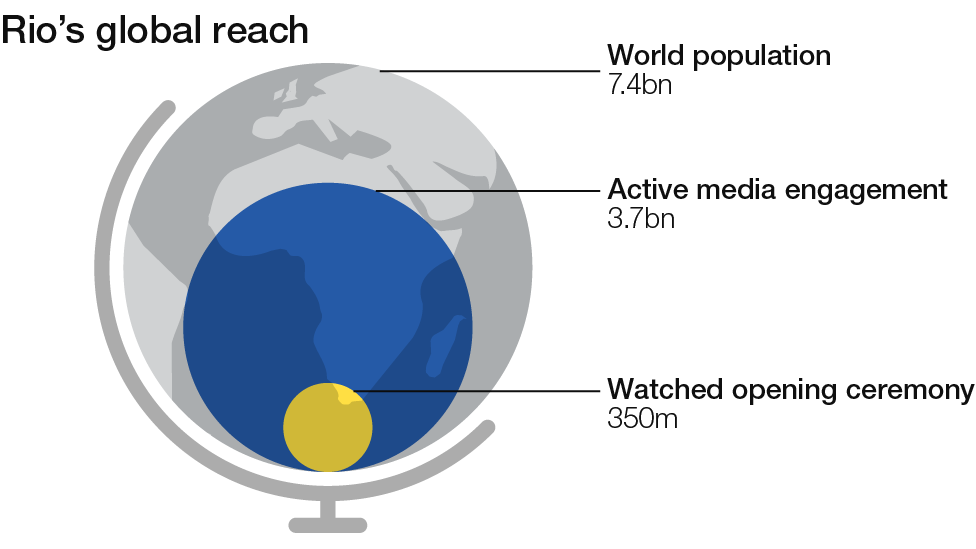
The viewing figures and the size of the sponsorship deals probably provide the best answers to this question.
Officials say more than half of the world's population consumed the Games in some way. That figure is expected to rise further for Tokyo in 2020.
No other sporting event in the world generates interest in quite the same way, but some have suggested there is an ever-growing disconnect between the Games and the public because of issues such as doping and corruption.
"I think it's been a step back from London," said Ben Rumsby, a correspondent for British newspaper The Daily Telegraph. "It was always expected to be, but I think it's been a bigger step back than the organisers expected and they'll be looking forward to Tokyo, which is expected to be a success."
Did Rio embrace the Games?
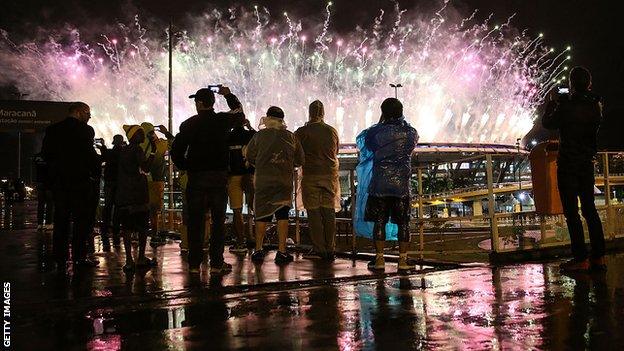
Some people enjoyed the closing ceremony fireworks from outside the Maracana stadium
Political protests before the Olympics, focusing on allegations of corruption and the huge cost of staging the Games, had organisers concerned.
So did worries over security, water pollution and the Zika virus.
But it was the empty seats in some of the venues that provided the biggest headache once the action started.
At first, organisers blamed long queues for the poor turnouts and then pointed out that the Brazilian people are notoriously slow at getting involved in sport, unless it is football or volleyball.
On day one of the athletics, only 58% of available tickets were sold.
"I think we expected the whole atmosphere to sweep us along for the two weeks," said four-time Olympic rowing champion and BBC pundit Matthew Pinsent. "I don't think that has quite happened.
"I do think the spectator ticket sales has been a huge issue that they must have seen coming and they haven't been able to solve."
Overall, there is a feeling organisers could have done more.
The price of a daily ticket, for example, was the equivalent of a half a week's wage for the average worker who lives in a favela.
Even if they were not in the arenas, though, locals were moved by the Games.
"Living in a favela isn't easy, especially when your country tries to make them invisible," said 19-year-old Isabella Alves de Oliveira, who lives in the infamous City of God favela.
"But when we watch people from a favela win Olympic gold, it is amazing.
"I hope the Olympics will leave a positive legacy, one of possibilities and one where children can dream and believe that these dreams can become reality."
What impact did the Russian doping scandal have?
Rio Olympics 2016: Yulia Efimova says 'Rio was awful - it was war'
It was the issue that dominated the build-up to Rio 2016, but, as expected, the action became the focus when athletes started to mount podiums.
There was a residual fallout that crept into the competition, though.
Some of the 271 Russian athletes who made it to Rio were booed, while swimmer Yulia Efimova, who has served a doping ban, was reduced to tears when jeers drowned out the announcement of her silver medal in the 100m breaststroke.
A handful of athletes tested positive during the Games but, given the small numbers so far, there was no controversy to match the pre-Games trouble.
And what about Zika?
It was one of the most talked about subjects before the Games, thanks chiefly to the number of top male golfers who withdrew.
Rory McIlroy, Jordan Spieth, Jason Day and Dustin Johnson all said Zika was a very real health threat, both to themselves and their partners.
When the action started, it was hardly ever mentioned.
Like those golfers, the mosquitoes stayed away.
What will Tokyo 2020 offer?
As an experience, Tokyo will be more polished, more high-tech and more intense than anything we have witnessed in Rio.
The Japanese capital is one of the most energetic and pulsating places on earth - and organisers are already hard at work to make the Games reflect this.
The addition of several new and exciting sports - like surfing, skateboarding and climbing - to the Olympic programme will no doubt help in this regard, too.
Many of the arenas are already in place, although there has been some controversy over the design and construction of the new Olympic stadium.
There is also an investigation into controversial payments made to officials linked to Tokyo's bid, while the first official logo for the 2020 Games had to be scrapped after claims of plagiarism.
"One thing we won't have to worry about in Tokyo is there isn't a lot of crime," Japan Times journalist Jake Adelstein told BBC Radio 5 live.
"Tokyo is ready to handle loads of tourists and it's a very safe city. How they'll deal with the heat is the question that is up in the air.
"When Japan submitted their bid for the Olympics, they wrote that the mild weather will provide athletes with conditions to perform at their best.
"But Tokyo, at this time of year, is anywhere between 30 and 40 degrees, with humidity at 80%, so if you feel that being on the inside of a sumo wrestler's armpit is the ideal way to perform at your peak, then Tokyo is the place to be."
Who can replace Bolt and Phelps?
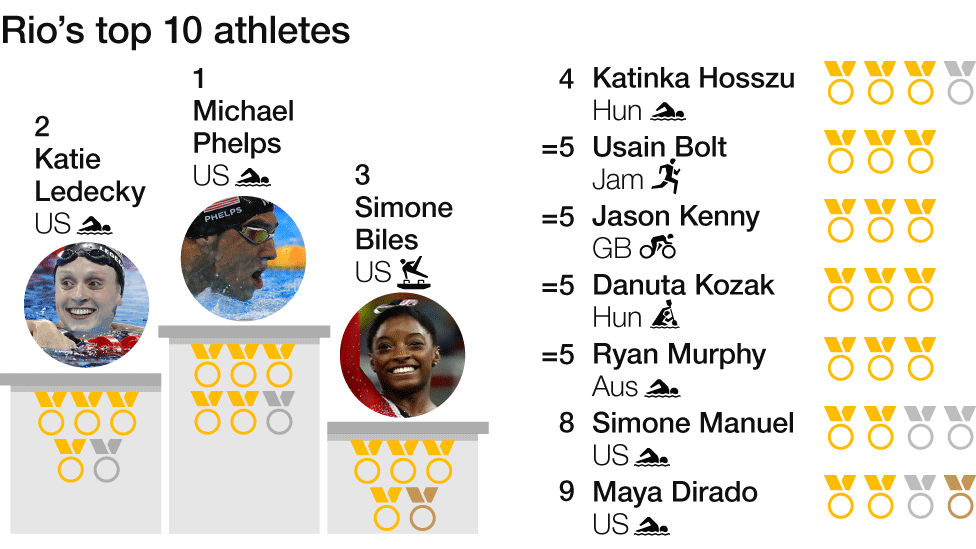
It is difficult to imagine the Olympics ever seeing the likes of Usain Bolt and Michael Phelps again, but sport needs heroes and new stars are emerging.
In the pool, 19-year-old Katie Ledecky leaves Rio with five Olympic medals, four of them gold. The American is the first women to take gold in the 200m, 400m and 800m freestyle since 1968.
"She is special," said former British swimmer Steve Parry, who won bronze at the Athens Games in 2004. "If she continues to progress the way she has been, she could smash all kinds of records."
Compatriot Simone Biles, also 19, also won four golds as she dazzled and bewitched in the gymnastics arena.
In the velodrome, British track cyclist Jason Kenny equalled Sir Chris Hoy's national record of six Olympic golds. If he races for as long as Hoy, then the 28-year-old probably has another two Games to get himself into double figures.
- Published22 August 2016
- Published21 August 2016
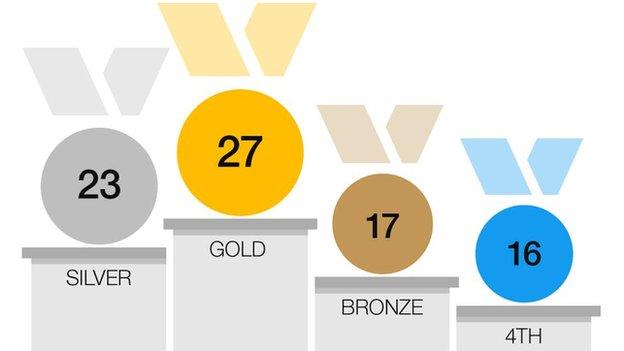
- Published21 August 2016
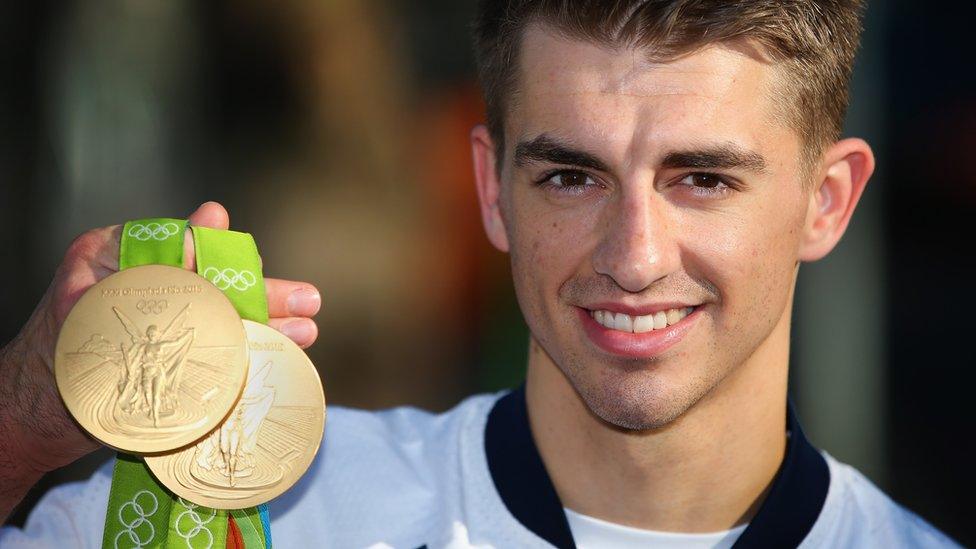
- Published18 August 2016

- Published3 August 2016
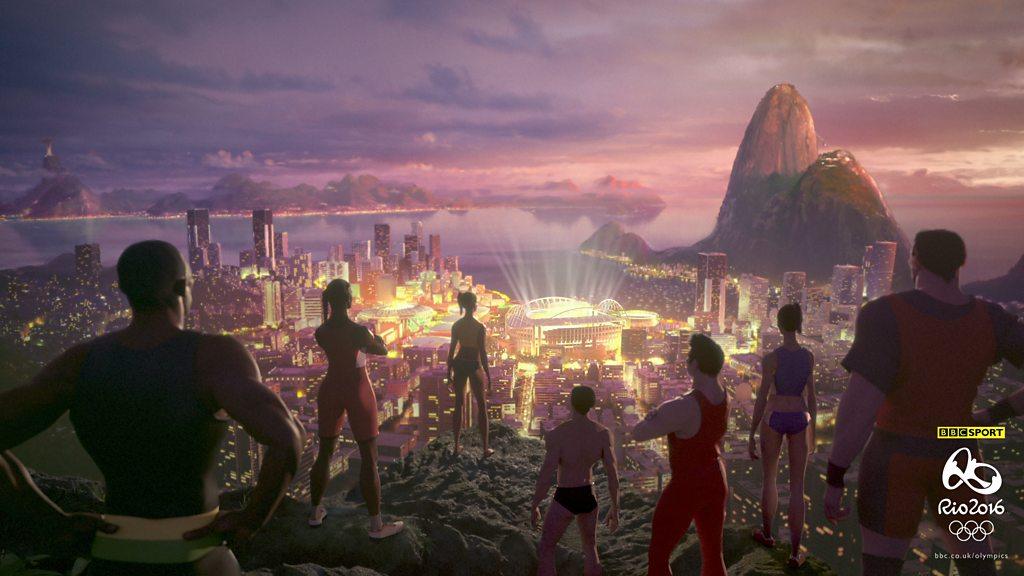
- Published19 July 2016
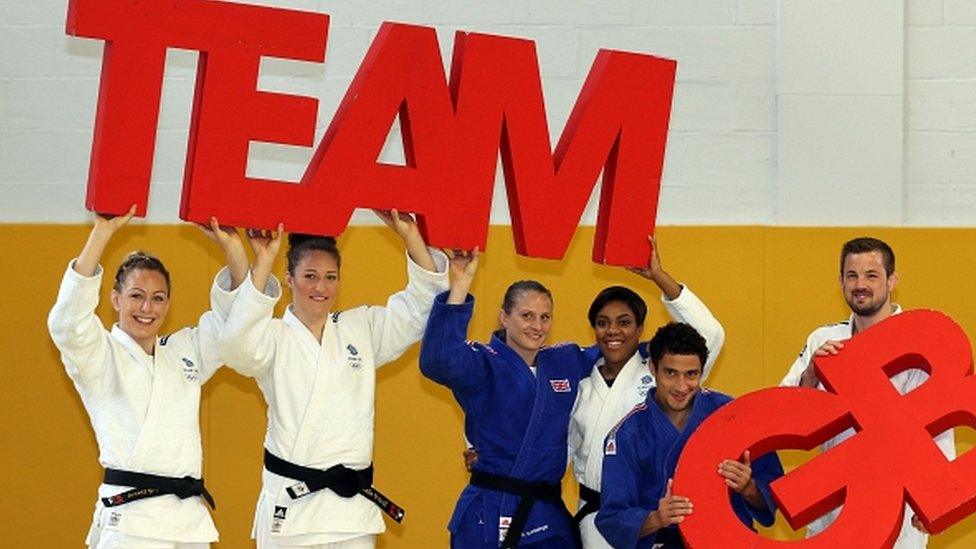
- Published3 August 2016
